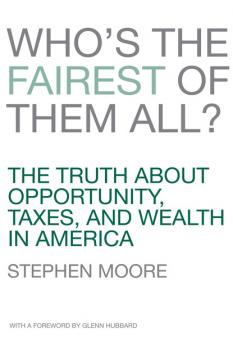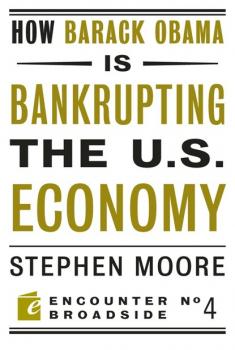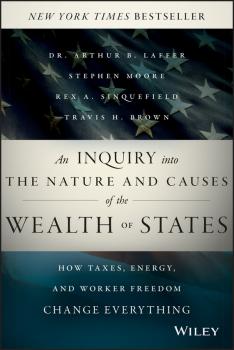Stephen Moore
Список книг автора Stephen MooreWho's the Fairest of Them All?
President Obama has declared that the standard by which all policies and policy outcomes are judged is fairness. He declared in 2011 that «we've sought to ensure that every citizen can count on some basic measure of security. We do this because we recognize that no matter how responsibly we live our lives, any one of us, at any moment, might face hard times, might face bad luck, might face a crippling illness or a layoff.» And that, he says, is why we have a social safety net. He says that returning to a standard of fairness where anyone can get ahead through hard work is the «issue of our time.» And perhaps it is.This book explores what it means for our economic system and our economic results to be «fair.» Does it mean that everyone has a fair shot? Does it mean that everyone gets the same amount? Does it mean the government can assert the authority to forcibly take from the successful and give to the poor? Is government supposed to be Robin Hood determining who gets what? Or should the market decide that? The surprising answer: nations with free market systems that allow people to get ahead based on their own merit and achievement are the fairest of them all.
How Barack Obama is Bankrupting the U.S. Economy
In his first nine months in office Barack Obama has pursued the most aggressive government expansionist agenda since Franklin Roosevelt’s new deal was launched in 1933. White House chief of staff Rahm Emanuel summarized the Obama first-year game plan best: “An economic crisis is a terrible thing to waste.” So far, we have seen multi-trillion dollar bailouts in housing, banking, insurance, and auto industries, the stimulus plan, cap and trade, a $1.2 trillion health care bill, and of course, the $4 billion cash for clunkers program. None of this has worked. Now, six months after the stimulus progam, we sit at 9.4% unemployment. Two million more Americans are jobless. The debt has exploded like a cork from a bottle of champagne. We are now told that the Obama agenda will cost $9 trillion in debt as it plans to spend $42 trillion over the next decade.In this riveting broadside, Stephen Moore explains this rotten story of Washington arrogance and malfeasance, and reveals exactly why Obamanomics failed.
Moore vs. Krugman
What happens when a leading conservative economist goes mano a mano with today’s most influential exponent of left-liberal economics, over free markets versus government interventionism? Here are highlights of that showdown between Stephen Moore of the Heritage Foundation and Paul Krugman, Nobel laureate.Moore and Krugman sparred over eight major economic issues in our national debate – from whether the policy response to the crisis of 2008 was successful, to the outlook for Obamacare, to the “red state / blue state” divide. The contest was cordial and spiced with wit. (Does air conditioning explain the migration from blue to red states? Is Houston still uninhabitable?)This high-powered matchup illuminates a clash of worldview that leads to opposing policy prescriptions. More important, it will help you draw conclusions about which economic policies work.
Presumed Lost
When submarines failed to return to port from patrol, they were officially listed by the Navy as overdue and presumed lost. Loved ones were notified by the War Department that their siblings, spouses, and sons were missing in action and presumed lost. While 52 U.S. submarines were sunk during World War II, the Japanese took prisoners of war from the survivors of only seven of these lost submarines. Presumed Lost is the compelling story of the final patrols of those seven submarines and the long captivity of the survivors. Of the 196 sailors taken prisoner, 158 would survive the horrors of the POW camps, where torture, starvation, and slave labor were common. This is the most complete and accurate record of their captivity experiences ever compiled. Author Stephen L. Moore draws on personal interviews with the survivors, as well as on diaries, family archives, and POW statements to reveal new details and correct longstanding errors in previously published accounts. Moore's research brought to light the following facts: Most crewmen from USS Perch endured 1,298 days of captivity without their families ever being told that they were still alive. The Perch and USS Grenadier were so badly damaged by enemy depth-charge attacks that their crews were forced to scuttle their ships. USS Sculpin and USS S-44 went down fighting, with only forty-two men from the Sculpin being taken prisoner and half of them perishing on the way to Japan. USS Tang and USS Tullibee, victims of their own faulty, circling torpedoes, had few survivors, five of whom managed to escape from the sunken, burning Tang when it was 180 feet below the ocean surface. As many as six men survived the loss of USS Robalo after it struck a mine off Palawan, but none of those survived the prison camps. The book includes dozens of rare photos of the POWs, many of which have never before been published. Appendices include final muster rolls of the seven submarines and a complete list of the U.S. submariners who were held as POWs, with details of their various camps of internment.
An Inquiry into the Nature and Causes of the Wealth of States. How Taxes, Energy, and Worker Freedom Change Everything
A passionate, detailed, quantified argument for state-level tax reform An Inquiry into the Nature and Causes of the Wealth of States explains why eliminating or lowering tax burdens at the state level leads to economic growth and wealth creation. A passionate argument for tax reform, the book shows that even states with small populations can benefit enormously with the right policies. The authors’ detailed exposition evaluates the impact state and local government policies have on a state’s relative performance and economic growth overall, backed up with economic data and analysis. Facts don’t lie. But they do point clearly to the failure of so-called progressive tax schemes designed more to curry favor with selected constituencies than to create an economic system that leads to individual wealth as the reward for hard work and entrepreneurial risk taking. An Inquiry into the Nature and Causes of the Wealth of States is a detailed and critical look at income taxation across the nation, and drills down into an analysis of the economic growth or malaise that results from tax policy. Arguing eloquently that a state cannot tax itself into prosperity, just as the impoverished cannot spend themselves into wealth, the authors point out what many inherently know but often fear to say out loud. The book provides detailed quantitative analysis, and discusses the policy variables that can have enormous effects on the financial well-being of states and individual residents, such as: Personal and corporate income tax rates Total tax burden as a percentage of personal income Estate and inheritance taxes Right-to-work laws An Inquiry into the Nature and Causes of the Wealth of States shows everyone how to evaluate state-level fiscal and economic policies to become more competitive.






